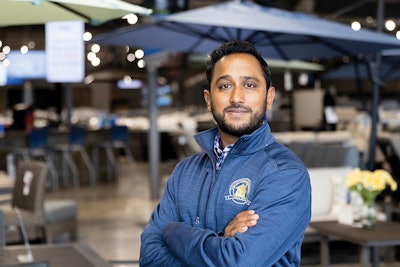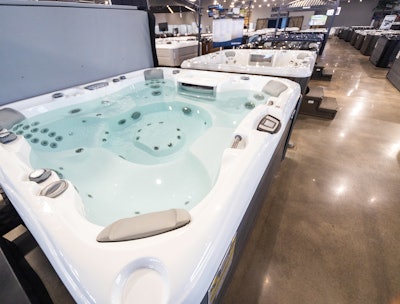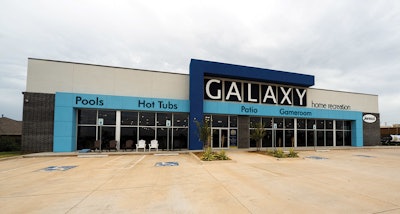
"My father was always really good about adapting with the times and always bringing innovation into the business," says Ronak Shah, president and CEO of Galaxy Home Recreation. “I think that is why we have been in business now for over 47 years.”
Shah, along with his wife, brother-in-law and sister, took over Galaxy Home Recreation when his father unexpectedly passed away in 2010. But his father’s principles — adaptation and innovation — have continued to be at the center of his business, and served the company especially well during the pandemic. Not only did Galaxy grow from 40 employees to 140 over the past two years, they have opened three new showrooms for a total of five locations: its original Tulsa, Okla.-based location (now a clearance center to appeal to pandemic-based customers), Broken Arrow, North and South Oklahoma City, and Northwest Arkansas.
Behind that growth is meticulous strategy, from implementing customer-centric communication to a thriving e-commerce website to new employee retention methods. We spoke with Shah about the pandemic-era, what business looks like right now, and his goals for the future.
Making Predictions
Galaxy Home Recreation has been shaping its inventory in accordance with consumer trends since its founding in 1975. “We see where consumers are going and based upon the economic environment, try to make sure that we’re staying ahead of it,” explains Shah.
In the beginning, the company carried Olhausen and Brunswick billiards. As the coin-operated business started to take off, they chose to onboard pop machines, jukeboxes, arcade games and more. “When that started to fade, and we realized that billiards wasn’t what it was back in the ‘70s, we looked at what else we could carry. And so, we brought on hot tubs, patio furniture and other backyard product categories.
“We continued to move further into the backyard market, and when my father died, shifted all of our focus to that. The cornerstone of that was the hot tub.”
Over the last 11 years, Galaxy Home Recreation’s hot tub department has blossomed. “When we first entered the hot tub game, it was a well-defined market,” says Shah. “We simply worked with the hot tub companies that were available. As we sold those models and developed referrals, we started getting attention from the more well-known manufacturers.”
Galaxy began to ask its own questions, ultimately partnering with new spa brands in a variety of sizes and price points, as the company strives for a low-, medium- and high-range option in all product categories. Selecting a hot tub brand was a three-fold process: 1) The brand must be one that people identify with and has value to the consumer. 2) It must be a brand that values innovation and presentation. 3) The manufacturer must be willing to work with the Galaxy team, in both the sales and service sectors, to become better business people.
Having already established itself as a multi-category, multi-brand business, Galaxy was in a good position at the start of the pandemic. “Specifically, we already had three hot tub brands, and all three were great partners,” says Shah. “They were used to not having exclusivity or the lion share. They knew our business model. We did onboard a fourth manufacturer who is also now a key partner of ours, and we did that in other categories. Those relationships are now stronger than ever, because of the way we have worked with each other throughout the pandemic.”

Pandemic Times
Back in March of 2020, when the pandemic first began, Galaxy Home Recreation had plans well underway to open its second showroom based in Oklahoma City, but things quickly changed — in a big way. “When we, like everybody, saw that the world was not going to end, we realized that this was a once-in-a-generation opportunity. The backyard had become king, people now wanted staycations, and hot tubs were going to go through the roof because people wanted to be in water. They needed it to be accessible, affordable and easy.”
Shah, along with his wife, sister and brother-in-law, with plans for growth already in place and a solid, well-rounded team of 40 employees, “felt [they] were capable of this type of moment, and went all in."
“We went forward with the plans to open our second Oklahoma City-based store, our fourth overall, which is our flagship store,” says Shah, “and then turned around and opened another in Northwest Arkansas, making it our fifth location.”
With that rapid growth came urgent hiring, but fortunately, Galaxy had top leadership already in place. "Internally, we are blessed to have four owners who have a broad array of expertise,” says Shah, “and because we had this foursome that was already used to handling different parts of our business, were able to better scale and manage our growing team.”
Staff Strategies
The early pandemic-era was tough on employee recruitment. Galaxy, having opened a number of new locations, had to hire its fair share of new employees, and quickly. “We knew that, every single day, hiring was a top priority. In the beginning — before we hired an HR generalist and director — we started rounding up anybody who wanted to work. Most were by referral, either by a friend or a current employee.”
The company is fortunate that a lot of its referrals are still there today. “A big reason why we are able to stay well-staffed, though, is because we over hire,” explains Shah. “We have a dedicated meeting every single day about hiring. It has become our daily ethos.”
Along with growth came a need “to hire a dedicated staff member to manage everything that comes with onboarding new employees,” says Shah. “A new trainer was central. She now serves as a large resource to help new hires understand the business, and our products and services.”
When social distancing restrictions first went into place, Galaxy implemented a virtual employee training program — something they have made permanent. “Our trainer has developed a full curriculum via virtual meetings and training sessions,” says Shah. “Then, after the initial training and orientation, the new hire moves into job shadowing; they’ll take a short quiz or do an exercise, and then practice what they’ve learned in the showroom, or across the various departments. But if we onboard three different people in three different departments, we are able to train them under the same virtual session, at the same time, which is very beneficial. Of course, our trainer will travel to each location on a case-by-case basis.”
The company chose to provide both new and older employees with a new laptop amid the change in protocol and will continue to do so. “Then, there is no question they have the tools needed to join meetings virtually,” explains Shah.
The laptop is extra useful on the retail side of things, as retail staff now has more flexibility to work from home, too. “Of course, across the pandemic, certain circumstances — school closings, health concerns, daycare cancellations — would lead our staff to work from home,” says Shah. “But with a reliable laptop, virtual meetings and consultations, reserving inventory, accepting payment, all of that was made possible from home. And employees can especially do successful lead retrieval at home.”
The sales staff still has reasons where they need to work from home, even now, and Galaxy believes in being flexible with remote work. “Normally, before, you might be like, ‘Oh, well you just need to be at work. Today is your work day,’” says Shah. “But that’s not always possible anymore. Now we say, ‘That’s great. That’s fine. You can work from home and handle leads today. The showroom will handle in-store walk-ins.’”
In addition to this added flexibility, Shah credits the rewarding atmosphere of the pool and spa industry itself with helping Galaxy’s employee retention rate now and throughout the pandemic period. “I’ve been in this business on and off since I was 15 years old, and I have a lot of passion for it,” he says. “I think when COVID hit though, how personal and real things are in life finally resonated.
“We had an opportunity to hire people when everybody else was laying people off. We had an opportunity to help families cope with their kids being at home, with something to do to help them connect in a constructive way versus being bored. And I think that really bonded us as a team. It changed the way we approached and talked and interacted with each other. It redefined how we wanted to be as a company.
“We have a lot of single parents who sometimes have to bring their kids to the showroom, and we accommodate that. These are things before COVID that were more out of sight, out of mind. We didn’t get involved or try to figure things out. But now since COVID, it’s becoming ingrained in us. Our employees are our number one asset; they are our lifelines. And anything we can do to make their lives easier is going to, in turn, help our company and our customers.”

Customer Communication
Galaxy describes the evolution of its customer communication across the pandemic and now as a confluence of events. When one problem arose, it seemed another followed.
At the beginning, consumers were shopping on the phone and from their homes — they weren’t visiting the stores. As a result, Galaxy quickly made changes to its e-commerce website, which essentially, became like “its own location, a new medium to reach people.”
The first question customers began to ask was, “‘How much? How much? How much?’ So we quickly placed our pricing on the new website, which we have never done before. It was our first big change.”
Then, the questions became more about the hot tub itself. “So we said, ‘Okay, we now have to be able to provide seamless communication. If a customer has a question about a certain model, we need to be able to respond. That’s when we partnered with Podium web chat, which we still have today.”
After social distancing lifted and customers began coming in the store again, the company quickly realized that despite efforts to grow its staff, they had more customers than salespeople could handle. “We had to find ways to be faster, quicker. Payments are now done by sending out a link. We now have a digital install agreement versus a person coming into the store. Even in service, we now do the initial troubleshooting virtually versus a site visit.”
All these changes were forced by the pandemic, but have helped the company find sustainable growth.
Galaxy also found a disconnect between the salesperson and customer from the time of sale to installation, and after delivery, so the company implemented a dedicated “scheduler,” who helps customers with site preparedness before a hot tub delivery, in scheduling delivery and in making sure they are supported post-sale — all of which is done via text.
New automated videos and messages also help to keep communication top-of-mind. “The main question that was asked was, if a salesperson did not exist, how do we make sure that people understand what they’re buying, that they don’t hate us afterwards, that they love the product as much as they should. Because all of the things we normally did and had time for, we don’t have time for anymore.”
After developing “a big book of customers,” Shah also fixated on the ability to know a customer’s entire sales history upon seeing them again (customer relationship management software HubSpot helps to tie all of the data together). “Which store did they go into? Who did they talk to? What have they bought? How many service calls have they had to be able to give a personalized service, so it’s not like, ‘Oh, hey, thanks for calling. What did you buy again? Why? You had what problem?’ Nobody wants that and especially doesn’t expect it anymore. Everybody is quick touch now — the Amazon effect during the pandemic.”
As for price increases, Galaxy has also found an effective way to communicate the change with customers immediately, a lesson they had to learn. “In the first year and a half, I think when there was a price increase every month or so, we just could not keep up with it. We started pricing by the market, what we thought the market would take. Maybe we sold the product for X, but now, by the time the product shipped to us, it had jumped 15% or so. We were taking a margin hit,” says Shah.
“Instead, we started to look at a product and base the price on what we thought we could sell it for, so that helped us maintain our margins. It also forced us to be very execution-oriented. We literally installed about 30 televisions in every showroom that communicate price and inventory to the customer. We change prices daily on our TVs. It takes us a flip of a switch to be able to roll out a price change now. Physical, hand-printed tags are a thing of the past for us.”
Inventory Management
Galaxy Home Recreation took a bold inventory approach amid the first few months of the pandemic, and immediately placed a large amount of purchase orders. Some might call this risky, especially to do so initially, but the risk paid off. “We greatly benefited from a large initial purchase, because we found that some vendors went with a first-in, first-out business model,” says Shah. “But our other vendors went with the allocation model, and that really did come to sting us.”
The company found that multi-sourcing, being able to pay in full upfront, and being able to take inventory straight away, helped tremendously in their inventory preparedness. “We expanded our main warehouse by 50,000 square feet — and rented another new warehouse in Arkansas just last week,” says Shah. “We say, ‘Hey, if you have it, we will take it.’”
Now, with the pandemic surge relaxing, Galaxy always has hot tubs in stock, including its line of swim spas, another pandemic change.
“We were definitely aware and knowledgeable about swim spas over the last couple of decades,” says Shah. “But during the pandemic, you could see the writing on the wall. Consumers wanted water. They wanted a pool and were looking at all sorts of ways to get it, whether it be a stock water tank, the mod pool, a container pool — or, a swim spa.”
Galaxy has invested marketing dollars to educate its surrounding communities on the benefits of swim spas, but mostly to let them know they’re in-stock. “The word in-stock is the key phrase,” says Shah. “Word has finally gotten out on what the swim spa is, and what it does, that it is an all-in-one versus the other options out there. And if customers see it, they believe that. If you can take away the objection of waiting, a customer will say, ‘I’d rather do this, even if it wasn’t what I was thinking of originally.’ And that helps a nice category to grow.”

Marketing, Then And Now
A natural increase in demand for backyard products led a lot of pool and spa retailers to opt out of marketing over the course of the pandemic; others simply didn’t have the time. Galaxy Home Recreation took a different approach.
“We marketed more,” says Shah. “We pushed the pedal to the metal on marketing after the pandemic started. We were able to buy cheaper and get a lot more air time and impressions.”
The company mostly did television advertisements. Because the stations lost a lot of their larger clients, who were no longer advertising, Galaxy was able to forge a relationship with them that the company benefits from today. “Not only do we get preferential rates, we do get value added. When there is nothing running on TV, some stations will run our commercials. They also partner with us now on giveaways. We started one called ‘Summer Staycation’ during COVID with one of the CBS affiliates.”
In terms of spending, the marketing budget did not change, explains Shah. “We actually didn’t take a dollar away,” he says. “But when I say we marketed more, I mean we received three times as much back for our dollar during COVID than we would normally.”
What's Next?
Galaxy Home Recreation is “seeing a drop in business from the prior year, especially in hot tubs and aboveground pools. We will probably normalize some of our purchasing in those categories,” says Shah. “But we’re not letting that dip scare us and instead, will continue to change the way we approach our business.
“We’re hell bent on taking those purchasing dollars and finding new categories, or older categories, that have an opportunity to make a difference in sales. We have grown every single year over the last 11 years, so we don’t want to take a step back.
“The larger question for us is, now that we have a larger customer base, how do we monetize that customer base? Whether that be through upselling, cross-selling, chemicals, aftermarket services for pools and hot tubs, things we haven’t done in the past. That’s a question we haven’t answered yet, but we’re going to explore it.”












































